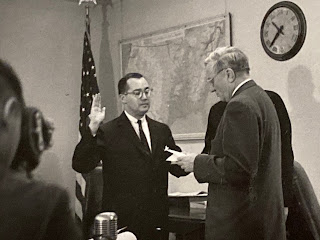Vast Wasteland: Marking the 50th Anniversary: WSJ
Federal regulators rarely are remembered for their oratorical prowess—or for that matter, remembered at all.
Chairman of the Federal Communications Commission, Newton Minow, delivered a speech still studied in rhetoric courses, including a soundbite that still rings true. It was Mr. Minow, then 35 years old and just on the job, who challenged American broadcasters to gaze upon the “vast wasteland” they had made of the public airwaves, degraded by “a procession of game shows, formula comedies about totally unbelievable families, blood and thunder, mayhem, violence, sadism, murder, western bad men, western good men, private eyes, gangsters, more violence, and cartoons. And endlessly, commercials--many screaming, cajoling, and offending. And most of all, boredom.”
Mr. Minow has been using The Speech’s 50 anniversary to raise concerns about today’s media landscape, which, like 1960s television, he believes is falling short of its potential to educate, inform and elevate American society. Monday night, he returned to Washington for a discussion at the National Press Club with his current-day successor, FCC Chairman Julius Genachowski, about The Speech and its aftermath.
Scholars who spoke credited Mr. Minow not only with shaming broadcasters into some programming improvements, but for other less heralded achievements, including pushing President John F. Kennedy to put a communications satellite in space, threatening to pull a Mississippi TV station’s license when it refused to air a black candidate’s campaign advertisements, and creating the modern system of televised debates between presidential candidates.
Not everyone has applauded Mr. Minow’s efforts. In the 1960s, sitcom producer Sherwood Schwartz got in a dig by naming the hapless ship on “Gilligan’s Island” the SS Minnow; earlier this month, one TV critic called Mr. Minow a “snob.”
But Monday night, 50 years to the day since Mr. Minow addressed the National Association of Broadcasters, was a tribute not only to The Speech, but also to the speaker, now 85, who seemed to embody a more optimistic and less brutish era in public life; Mr. Minow may be among the few to count as friends fellow Chicagoans Donald Rumsfeld (who, as defense secretary, sought Mr. Minow’s advice on data mining and military commissions policy) and Barack Obama (who was a student of Mr. Minow’s daughter, Martha Minow, now dean of Harvard Law School). Recalling the musical that President John Kennedy loved and which came to symbolize his administration, “Camelot,” one speaker described Mr. Minow as a knight of JFK’s Round Table, a compliment Mr. Minow quickly validated with anecdotes about the late president.
In that spirit, Mr. Minow picked up his lance to take on a current debate over taxpayer subsidies for public broadcasting. He recalled that Republicans once were its champions, as head of the Public Broadcasting Service (then called National Educational Television) in 1969, he enlisted Sen. Barry Goldwater (R., Ariz.) to help persuade the Nixon administration to free up funding to launch “Sesame Street.”
Then, however, there were only three broadcast networks. Mr. Minow was asked if today’s plethora of commercial programming choices obviates the need for federal support.
“Why do we have public libraries? We have bookstores. Why do we have public parks? We have country clubs,” Mr. Minow said. Until commercial television creates shows like the Ken Burns’s documentary “The Civil War,” educational series like “Sesame Street” and news programs like “The PBS NewsHour,” he said, “I don’t think it’s a valid argument.”
Copyright ©2023 Dow Jones & Company, Inc. All Rights Reserved. Photo copyright Jess Bravin 2011


Comments
Post a Comment